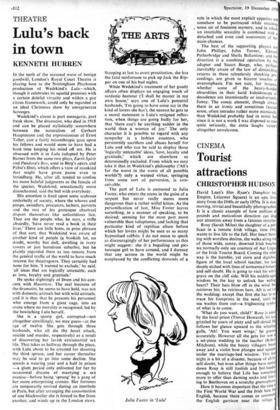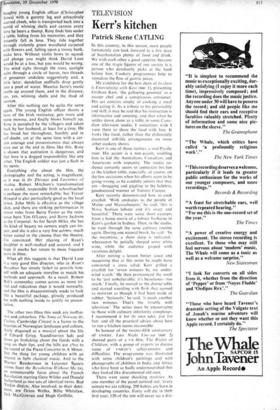CINEMA
Tourist attractions
CHRISTOPHER HUDSON
David Lean's film Ryan's Daughter Empire, Leicester Square) is an epic love story from the1940s or early1950% It is slow moving, trivial and beautifully photographed It is a classic example of how millions o pounds and meticulous direction can d our attention away from a fatuous storyline Rosy (Sarah Miles) the daughter of a pub lican in a remote Irish village, time 1916 wants to live life to the full. Her heart burst ing with wordless desires, she walks along on of those wide, sunny, deserted Irish beaches we normally only see courtesy of Aer Lin or the Irish Tourist Board. Coming the othe way is the humble, yet stern and dignified figure of the local school teacher, his far deeply etched with lines of tormented honest and self-doubt. He is going to visit his wife's grave on the cliff side. Will his middle-ag wisdom be the key to unlock her welli heart? Their hats blow off in the wind. S retrieves his; he retrieves hers. All is set fo the wedding: except that first she has to trace his footprints in the sand, until sea washes them out—a frightening symbo of what is to come.
`What do you want, child?' Rosy is ask by the local priest (Trevor Howard), his lac• grizzled by years of piety and self-denia1.11• follows her glance upward to the wheelie gulls, `Ali 1 You want wings,' he guesses accurately. However all she gets for now a set-piece wedding to the teacher (Robert Mitchum), while the boozy villagers booze away and a violin bow plunges and squeaks under the marriage-bed window. This fi night is a bit of a disaster, because of all his self-doubt, but even after things have settled down Rosy is still foolish and hot-headed enough to believe that Life has something more to offer than darning socks and listen- ing to Beethoven on a scratchy gramophone,. Here it becomes important that the time s the First World War and the Irish hate English, because there comes to common' the English garrison near the village haughty young English officer (Christopher Jones) with a gammy leg, and attractively scarred cheek, who is transported back into a world of whining shells and cannon every time he hears a thump. Rosy finds him under a table, hiding from his memories, and they instantly fall in love. They ride together through violently green woodland carpeted with flowers and, falling upon a mossy bank, make love. Without violin bows to squeak and plunge you might think David Lean would be at a loss, but you would be wrong. The wind sighs through the trees, sunlight stabs through a circle of leaves, two threads of gossamer undulate suggestively and, a little later, dandelion puffballs drop gently into a pool of water. Maurice Jarre's music swells up around them, and in the distance, yes, yes, whining shells and the thud of cannon.
After this nothing can be quite the same again. The young English officer shoots a hero of the Irish resistance, gets more and more morose, and finally blows himself up. Rosy is punished by the villagers and taken back by her husband, at least for a time. He has loved her throughout, humbly and in self-doubt, yet at the same time with a cer- tain courage and possessiveness that always wins out at the end in films like this. Rosy is shown that aspiration is dangerous, and that love is a dogged responsibility like any other. The English soldier was just a flash in the pants.
Everything else about the film, the photography and the acting, is magnificent, as it was in Dr Zhivago and Lawrence of Arabia. Robert Mitchum's transformation into a stolid, respectable Irish schoolteacher is perhaps the most remarkable: but Trevor Howard is also particularly good as the local priest, John Mills is effective as the village idiot, and there are striking performances in minor roles from Barry Foster as the resis- tance hero Tim O'Leary. and Barry Jackson as the Corporal. As for Sarah Miles, she has the kind of beauty no camera angle can im- pair, and she is also a very fine actress, much better suited to the cinema than the theatre, convinced. Her playing of Ryan's daughter is well-studied and assured. and I hope it marks her return to more frequent parts in films.
What all this suggests is that David Lean is a very good film director, who in Ryan's Daughter has simply failed to provide him- self with an adequate storyline to match his methods and approach. As a result, Robert Bolt's screenplay comes across as more tri- vial and ridiculous than it would normally, and the film is disappointingly made to look like a beautiful package, glossily produced but with nothing inside to justify its presen- tation.
The other two films this week are inoffen- sive and-colourless. The Song of Norway (u, Casino, Cambridge Circus) is a hymn to the beauties of Norwegian landscape and culture, thinly disguised as a musical about the life of Edvard Grieg. Scandinavian lads and lasses go frolicking about the fjords with a song on their lips, and the hills are alive to the sound of the Piano Concerto in A Minor. Just the thing for young children with an interest in light classical music. And to the Warner Rendezvous in Leicester Square Comes Start the Revolution Without Me (A), an unmemorable farce about the French Revolution starring Gene Wilder and-Donald Sutherland as two sets of identical twins. Bud Yorkin directs. Also involved, to their detri- ment, are Orson Welles, Billie Whitelaw, Jack MacGowran and Hugh Griffiths.







































 Previous page
Previous page